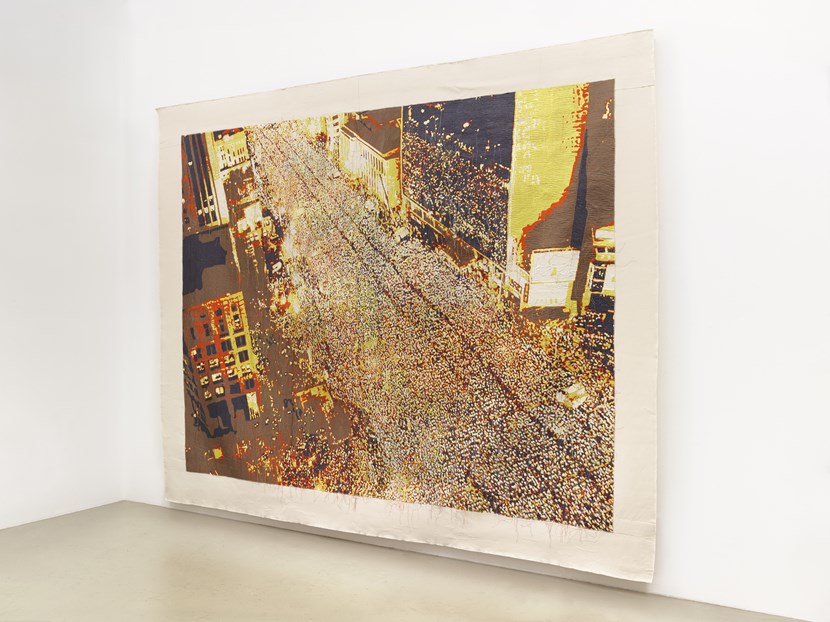
26 Jan 2024
Gallery’s new exhibition puts cities in the frame
A new exhibition at Leeds Art Gallery curated by Turner Prize-winning artist Lubaina Himid explores cities and the urban environment through the eyes of women and gender non-conforming artists.
Found Cities, Lost Objects opens at the gallery on Friday (Jan 26).
An Arts Council Collection touring exhibition, it features more than 60 works from the 1970s to the present day - including painting, sculpture, photography and film - and addresses themes ranging from safety and navigation to concepts of belonging and power.
Found Cities, Lost Objects places conversation between audience and artist at its heart, exchanging observations, memories and imaginings to explore a greater sense of self and consideration of our own relationships with the city.
Artworks from the Arts Council Collection will be on display together with those drawn from the Leeds Art Gallery collection and works by artists based in Leeds and Yorkshire.
The birthplace of the Reclaim the Night movement in 1977, Leeds has always had a radical feminist history. It is also home to the first women-run animation studio in the UK, the Leeds Animation Workshop (LAW), established in 1978 and still running from their base in Harehills. LAW is a not-for-profit cooperative that produces and distributes animated films and films on social and educational issues, often affecting women and girls.
Another ground-breaking and radical women-led cultural centre in the city was The Pavilion Women’s Photography Centre (1983-1993), a project platforming women’s photography as well as encouraging its production via skill-sharing and access to a working darkroom, where women learnt how to represent themselves on their own terms. Both LAW and The Pavilion are represented within the exhibition.
Helen Chadwick’s Train of Thought (1978) from the Leeds Art Gallery and the Archive of Sculptors’ Papers held at Henry Moore Institute, is about the internal monologue of a woman sitting next to a stranger on the Tube.
susan pui san lok’s film Trailers (RoCH fans and Legends) (2015) overlaps the everyday mundanity of the traditional British high street seen through Google Street View with film clips of martial arts film sequences.
Elsewhere in the exhibition, artist Hannah Starkey traces her interest in street photography to the French 19th-century concept of the urban wanderer, the flâneur, or rather its much less known female version, the flâneuse. The artist is captured via a reflection in the moment of taking a photograph, the street around her fractured and distorted in the mirror’s multiple planes.
Leeds-based artist Michelle Duxbury’s film documents her experience of living through a pandemic and having to self-isolate in a single room of the family house. The artist transformed her room into a giant camera obscura, projecting the streets outside onto the interior walls.
Deborah Smith, Director, Arts Council Collection, says: “It’s always exciting to see what fresh perspective artists will bring and what stories they will tell when we give artists an open brief to curate the Arts Council Collection. The Collection has enjoyed a long relationship with Lubaina, from acquiring her work in 1988 to her show Meticulous Observations at the Walker Art Gallery, Liverpool, where she first mined the depths of the Arts Council Collection. Found Cities, Lost Objects’ exciting diversity of female and gender non-conforming artists offers new perspectives on urban life and helps us understand how art is a powerful tool in shaping our cities and the world around us.”
Lubaina Himid CBE, artist, says: “Found Cities, Lost Objects challenges the status quo by encouraging viewers to discover the city through the eyes of female artists. Women traditionally inhabit cities via retail and healthcare venues and, for those with the means, theatres, galleries and cafés. But how can women expand their presence beyond this for everyone’s benefit as the landscape on the high street changes? The exhibition explores the contradictory experiences of women across the city, free to roam the streets and experience the exciting possibilities city life offers while always considering the boundaries within which that freedom is contained.”
Councillor Jonathan Pryor, Leeds City Council's deputy leader and executive member for economy, culture and education, said: “It’s fantastic to see works from Leeds and Yorkshire featuring alongside artists from around the world in this prestigious exhibition.
“It’s also fascinating to see the many different ways these artists interpret such an important and culturally relevant theme.”
Artists featured in the exhibition include: Dani Abulhawa, Manuela Amey, Phyllida Barlow, Chloë Brown, Sophie Calle, Hackney Flashers, Helen Cammock, Helen Chadwick, Rebecca Chesney, Jesse Darling, Milena Dragicevic, Michelle Duxbury, Feed, Anthea Hamilton, Mona Hatoum, Young In Hong, Leeds Animation Workshop, Yve Lomax, Markéta Luskačová, Melanie Manchot, Caroline Mardon, Sam Metz, Lisa Milroy, Jade de Montserrat, Maggie Murray, Krissi Musiol, Matrix Feminist Architecture, Cornelia Parker, Pavilion, Phyllis Pearsall, Susan Philipsz, susan pui san lok, Tai Shani, Lynn Silverman, Nicola Singh, Hannah Starkey, Magda Stawarska-Beavan, George Storm Fletcher, Rhea Storr, Anne Tallentire and Elizabeth Wright
ENDS
For media enquiries contact:
Leeds City Council Communications team
communicationsteam@leeds.gov.uk